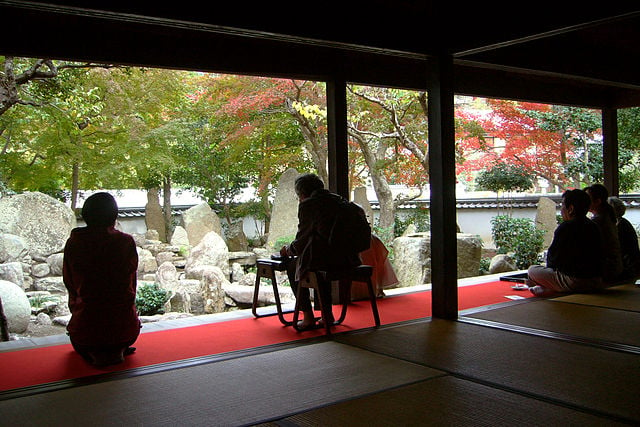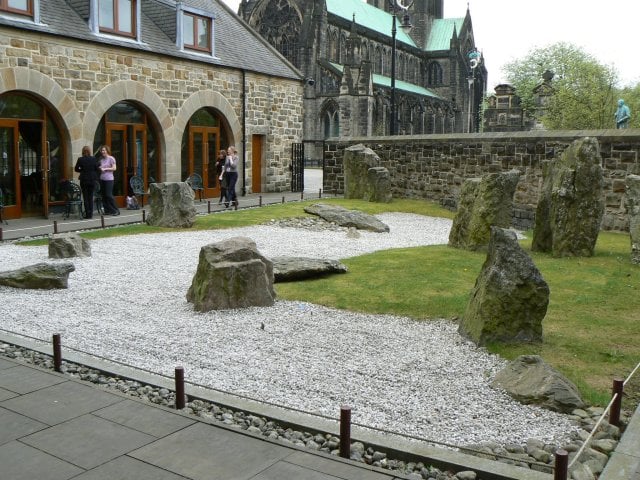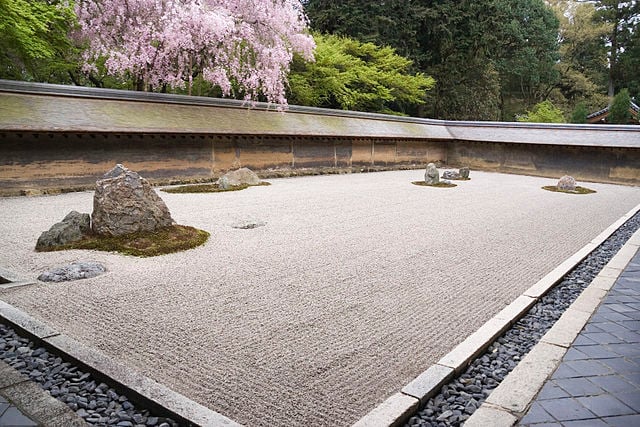Could a zen garden work for you?
We could all use a bit more zen in our lives.
You may have heard people say that, especially when life is frantically busy and complicated. They are crying out for simplicity and tranquillity.
This post takes a look at the Japanese rock garden tradition, and the classical zen garden and what it can teach us.
Japanese garden design and the dry landscape
There are several types of Japanese garden styles. One of them is the Japanese 'dry landscape' or rock garden style which has been in existence since at least the 11th century and probably since the 8th century.
Karesansui, to give the garden its Japanese name, means ‘dry mountain water’. This refers to sand or gravel, raked in a variety of ways, which represents water and the sea. Dry landscape gardens also include large stones and moss, and sometimes small evergreen trees or large shrubs which ensure the garden looks the same all year round. There may also be water features, lanterns or bridges.
Zen Buddhism and zen gardens
When Zen Buddhism came to Japan from China at the end of the 12th century it brought with it the Chinese garden style of the time, the ‘pond and island’ style.
Later, in the 14th and 15th centuries, the important Zen Buddhist temples in Kyoto developed a new style of garden. It was more like the Japanese ‘dry landscape’ rock gardens and was designed to stimulate meditation. The most famous of all zen gardens in Kyoto is Ryoan-ji, which is purely abstract.
A classical zen garden is designed for contemplation
To the western eye, a classical zen garden is a surprise. It is usually relatively small and surrounded by a wall. It is designed for contemplation and to be viewed, while seated, from a single viewing point outside the garden such as a veranda.

Viewing the karensansui at An'yō-in, Kobe, Japan. This garden was completed in the Azuchi-Momoyama period, 1568–1600. © 663highland and reused under https://creativecommons.org/licenses/by/2.5/
The zen garden comprises raked gravel, rocks, moss. If there are plants other than moss, they are very few. This is the created landscape; this is the garden.
The raked gravel represents the sea.
The rocks represent the mountains.
The moss is the earth.
A zen garden cannot just be thrown together and creating one is an art. Rocks have deep meaning, for example, with families keeping stones for generations.
What can the zen garden teach us?
We are talking about ‘less is more’. And none the worse for it.
As a design, the zen garden has much to teach busy western gardeners.
- A few carefully chosen and carefully placed local and natural items can create a complete garden.
- Gardening need not be a seasonal whirl of soil maintenance and plant growth.
As a garden, the zen garden has much to teach busy western minds.
- The lack of visual clutter is calming.
- The minimalist design requires little maintenance, opening up time for meditation or relaxation.
- The pared-down style opens up mental space.
Visit some zen gardens
For inspiration, take a look at The Japanese Garden Society’s slideshow and its map showing selected zen gardens in Britain.
Britain’s first permanent zen garden is behind Glasgow's St Mungo Museum of Religious Life and Art, adjacent to the cathedral.

The first permanent zen garden in the UK is at the St Mungo Museum of Religious Life and Art. Glasgow Cathedral is visible in the background. © James Allen and reused under https://creativecommons.org/licenses/by-sa/2.0/
What about other Japanese garden styles?
Perhaps you love growing plants of different kinds and a zen garden would be a step too far. Even a dry landscape with one or two carefully chosen trees or a bridge might not hit the spot. You could consider some of the other Japanese garden styles and we’ll be coming back to these in the future.
But at the end of the day
A zen garden is worth considering. This can’t be bad -
More mental space + feeling calmer + more time = probably feeling happier.
Sign up for our emails below, so we can send you blogs on gardening tips, as well as updates on our sales, so you don’t miss out on those garden furniture bargains!








